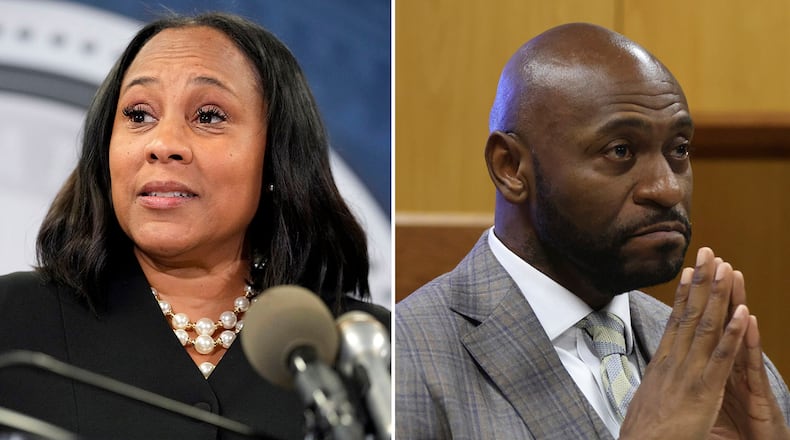When Fulton County District Attorney Fani Willis announced criminal charges against Donald Trump and 18 of his allies for interfering in Georgia’s 2020 election, she made international headlines.
But just months later, the case was roiled by allegations of an “improper, clandestine personal relationship” between Willis and Nathan Wade, a private attorney she hired as special prosecutor.
Now the last remaining criminal case against Trump is on life support.
Here’s a timeline of how we got here:
Nov. 3, 2020: Democrat Joe Biden defeats Trump to win the presidency. Several races − including Georgia — are too close call on Election Day. Biden will go on to win Georgia by a narrow margin, the first Democratic presidential candidate to claim the state in nearly 30 years.
Jan. 1, 2021: Fani Willis takes office as Fulton County district attorney after defeating her former boss in the Democratic primary and running unopposed in the November election.
Jan. 2, 2021: In a phone call, Trump urges Georgia Secretary of State Brad Raffensperger to “find 11,780 votes” needed to overturn his loss in the state.
Feb. 10, 2021: In a letter to top Georgia officials, Willis says she’s opened a criminal investigation into interference in the state’s 2020 general election.
Nov. 1, 2021: Willis hires Wade as special prosecutor in the investigation. She offered the job to several other Georgia attorneys, including former Gov. Roy Barnes, but they declined.
Aug. 14, 2023: Trump and 18 supporters are charged in a 41-count indictment alleging they acted as a “criminal enterprise” in an attempt to subvert the election results in Georgia.
September-October 2023: Four defendants — Scott Hall, Sidney Powell, Kenneth Chesebro and Jenna Ellis — strike deals with prosecutors and plead guilty to various charges.
Jan. 8, 2024: An attorney for defendant Michael Roman files a motion seeking to disqualify the DA’s office from the case because of an alleged romantic relationship between Willis and Wade. The filing says that because Wade paid for trips they took together, Willis benefited financially from the arrangement.
Jan. 14, 2024: Willis delivers a 35-minute speech at the historic Big Bethel AME Church in which she defends Wade and suggests racism is behind the accusations.
Jan. 19, 2024: Attorneys for Wade’s estranged wife, Joycelyn, attach some of his credit card records to a court filing in his divorce. They confirm that he purchased plane tickets and other expenses for Willis and himself for a trip to Miami in October 2022 and another to San Francisco in April 2023.
Jan. 25, 2024: Trump joins Roman’s motion to disqualify Willis. His attorneys also accuse the DA of trying to “foment racial bias” that could prejudice a jury, citing her comments at Big Bethel AME Church. In the coming weeks, other defendants also join the motion.
Feb. 2, 2024: Willis and Wade acknowledge a “personal” relationship in a court filing. But they deny any improper behavior and say their relationship is not grounds to disqualify them from prosecuting the case.
Feb. 15-16 2024: Fulton County Superior Court Judge Scott McAfee convenes an evidentiary hearing to investigate the claims. Willis takes the stand and defends herself in emotional and combative testimony. Wade also testifies. Much of the testimony centers on whether Wade and Willis testified truthfully about when their relationship began.
March 1, 2024: McAfee hears closing arguments and declines to admit additional evidence, such as Wade’s cellphone records, which Trump’s lawyers say bolstered their argument that Wade and Willis were romantically involved earlier than they acknowledged.
March 15, 2024: McAfee rules that Willis has a choice: recuse herself and her office from the case or allow Wade to withdraw. McAfee says that while the defense did not prove that an actual conflict of interest existed to disqualify the DA, the appearance of impropriety “infects” the prosecution team. Hours later, Wade resigns. Defense lawyers will appeal the decision.
Nov. 5, 2024: Trump is reelected to a second term, casting doubt on the future of the Fulton County prosecution. Willis is also reelected to a second term, easily defeating a Republican challenger.
Dec. 19, 2024: In a 2-1 decision the Georgia Court of Appeals rules that Willis and her office should be disqualified from the case. Willis’ office signals they will appeal to the Georgia Supreme Court.
Sept. 16, 2025: In a 4-3 decision, the Georgia Supreme Court refuses to hear Willis’ appeal, meaning the lower court’s ruling stands and Willis is ousted from the case. The case is sent to the Prosecuting Attorneys’ Council of Georgia — or PAC — to decide next steps.
Nov. 14, 2025: Pete Skandalakis, head of PAC, names himself special prosecutor in the case, saying that he was unable to find another attorney who would take the job. He will now decide whether to move forward with the case or abandon it.
Nov. 26, 2025: McAfee dismisses the case without prejudice, meaning the charges could be brought again. His announcement comes after a 22-page report from Skandalakis in which he said that he could not find a prosecutor willing to take the case and that it was a better fit for federal court.
About the Author
Keep Reading
The Latest
Featured



